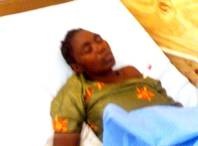They Are Very Small, and Very Deadly
You may not get a correct picture of how terrible a mosquito can be until you get bitten by an infected mosquito and go through a process of having a malaria attack. Lack of immediate help may lead you to a premature death. It is unfortunate that these tiny creatures have evolved into becoming resistant to a number of anti-malaria drugs. This has led to difficulties in getting cured of malaria, in countries like Malawi.
On the morning of 5th February 2008, I got to my clinic only to find a Mr. and Mrs. Milanzi, waiting for me next to the entrance to the clinic. The woman looked dehydrated and in great pain. As I helped the poor woman into the clinic, I felt the heat emanating from her body and the pathetic look of her face. I could tell without getting into all the routines that this was another malaria case. The disease has killed more people than those who have succumbed to HIV.
Temperature Reaches 104

I admitted the patient to our observation room. We opened an intravenous line and started administering fluids while waiting for a laboratory confirmation of malaria. The results indicated she should be classified as a P. Falciparum 3+, the most serious form of malaria. We continued with intravenous quinine administration.
The patient required more observation time than we could afford. We wish she had remained within our premises for an additional observation time. Unfortunately our facilities are limited and could only keep her until knock off time.
At 1700, we had to send Mrs. Milanzi home, though not fully recovered. However, we had done the best we could in getting her out of the danger zone and kept our fingers crossed that her condition should not suddenly change for the worse.
Malaria can be worse especially when all the necessary undertakings have not been adequately done. The vomiting and episodes of diarrhea often leave a patient very dehydrated. Temperature spikes leading to convulsions sometimes complicate the situation.
A medical attendant is usually caught up in a dilemma of whether to send a patient home or observe him or her until one has fully recovered and walk home without any support. That is an ideal set up. Nevertheless, we are working towards there and one day we will be comfortable to keep patients, like Mrs. Milanzi, at our premises until they are fully recovered.
Above everything, we need to point out that we had the confidence of handling this case because of the availability of some medical consumables we benefited from Malawi Project.
There are many people who share the same joy today because of a helping hand from the Malawi Project. We wish the Lord’s blessings over the Malawi Project Team.

